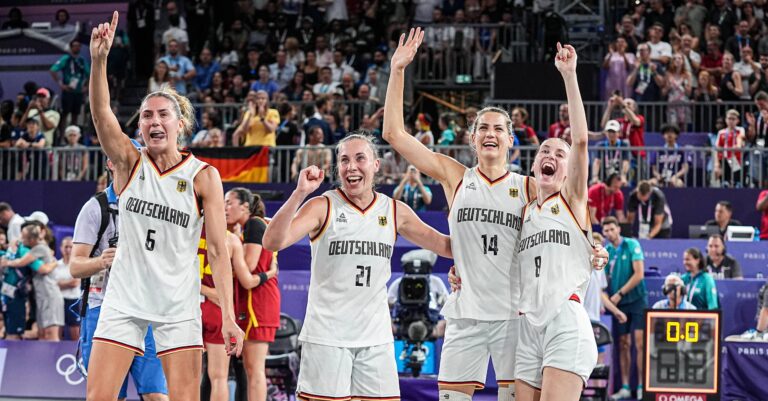
Priceless
3. September 2025
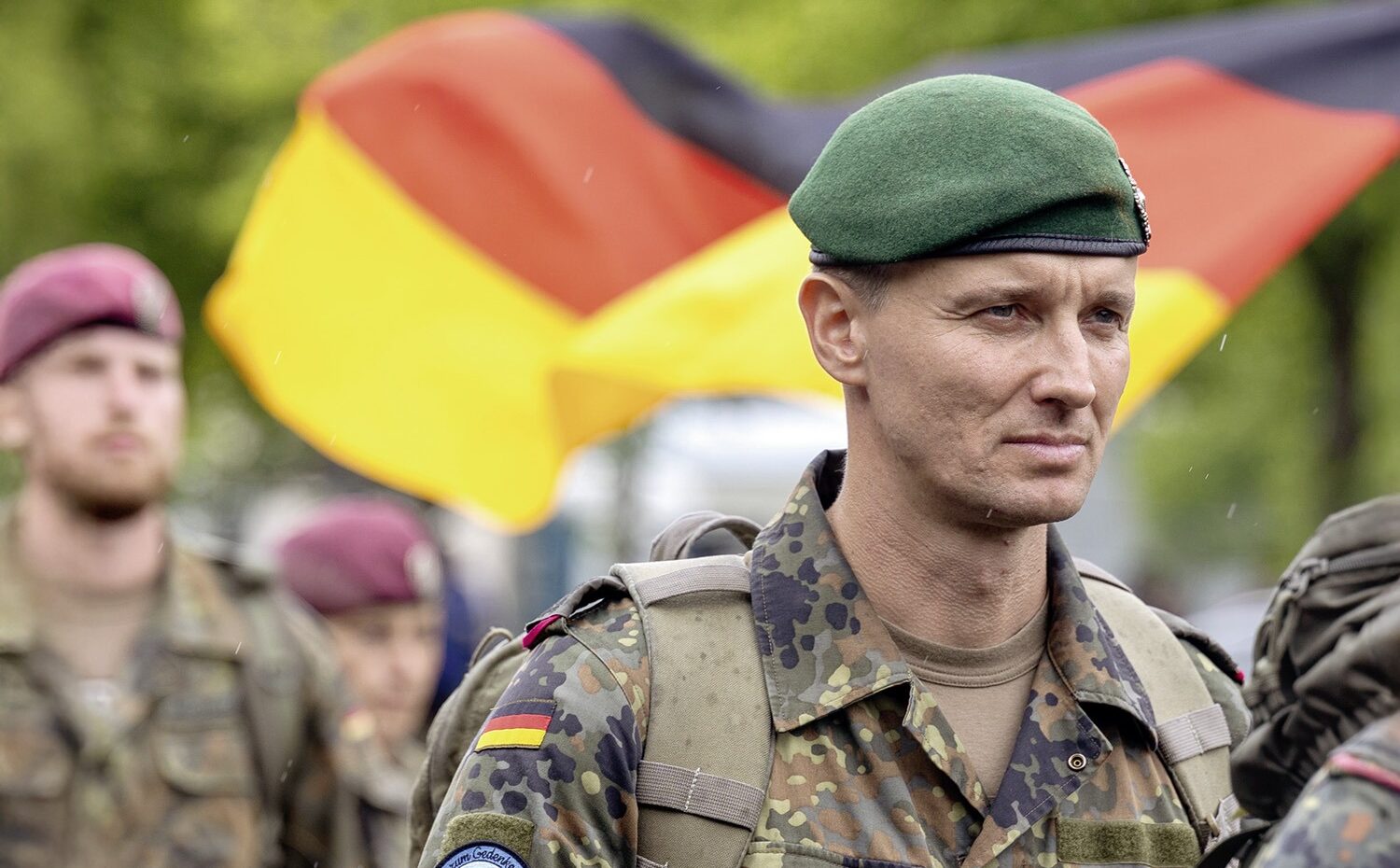
On 15 June 2025, the Federal Republic of Germany honoured the service of its active and retired soldiers for the first time with a National Veterans’ Day. Rheinmetall is also actively involved, sending out an important signal of appreciation.
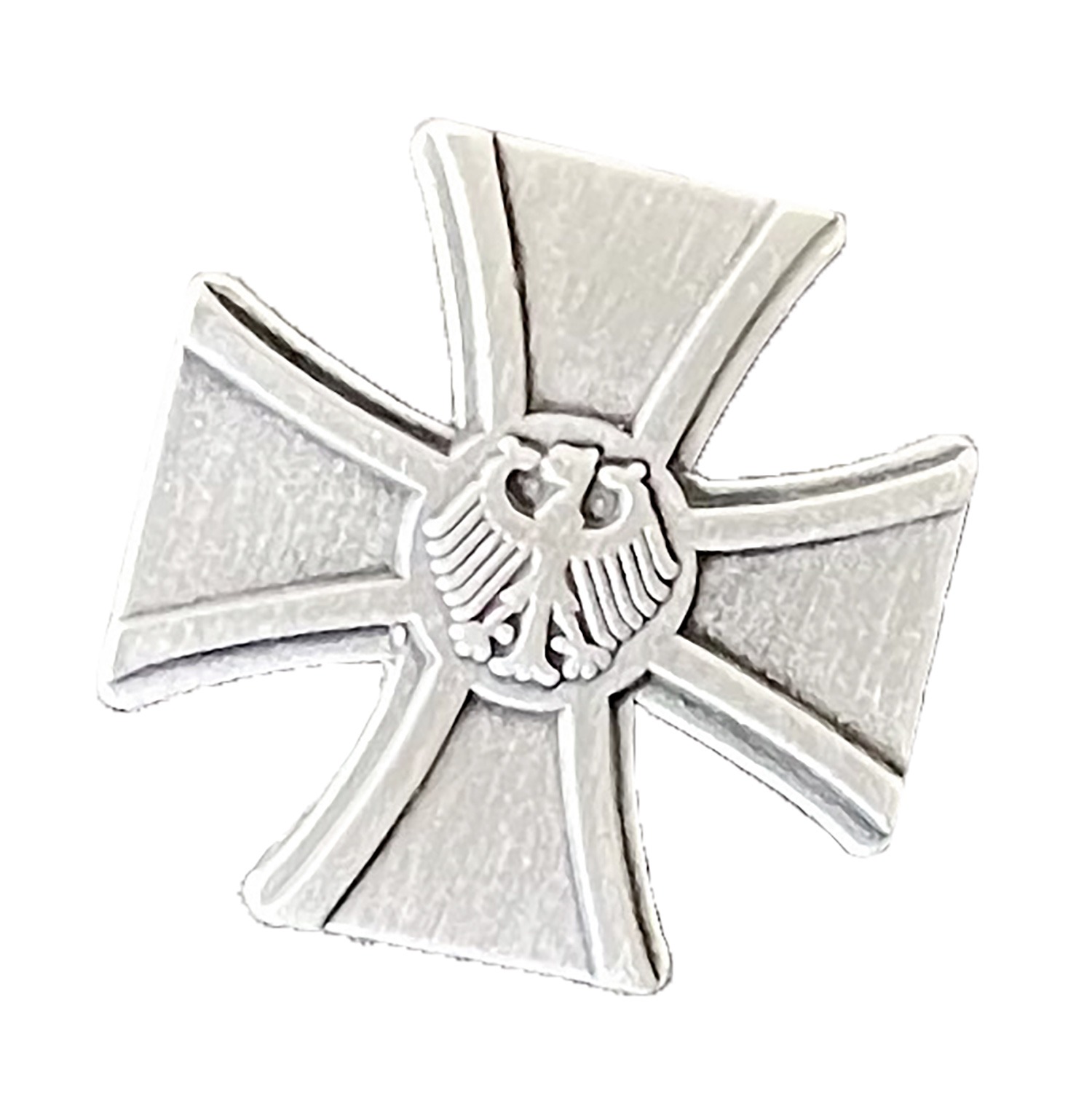
Trivia
According to the official definition introduced by the German government in 2018, a ”veteran of the Bundeswehr” is “anyone who is serving as a soldier in active duty or has honorably left this service, precisely, one who has not lost the rank”. This applies to active and retired soldiers as well as reservists – an estimated ten to eleven million people. This inclusive understanding of the term does not meet with universal approval, especially among those “veterans who were physically deployed”. Nevertheless, it is becoming increasingly established in society.
Anyone who meets the definition as a Bundeswehr veteran can apply for the veteran’s badge through the Armed Forces Office. The medal with the federal eagle in front of an Iron Cross is not considered a medal or decoration and is therefore only to be worn on civilian clothing.
The central point of contact for all Bundeswehr veterans is the Veterans’ Office in Berlin, which was inaugurated in January 2024. Rheinmetall offers interesting career prospects for
soldiers leaving the armed forces from all branches,
organisational areas, and ranks. Unsolicited applications
can be sent to www.rheinmetall.com/en/career/
rheinmetall-top-employer/people-projects/career-extrasoldiers
Although veteranus means “long-serving” or “experienced”, though these terms hardly define the recognition deserved by members of the German Bundeswehr. “A veteran culture, as we know it from many other countries, has been a neglected topic in this country for many years. It has only been able to grow as a grassroots movement in recent years”, says Lieutenant Colonel Marcel Bohnert. The combat-experienced mechanised infantry officer and vice chairman of the German Armed Forces Association is one of the most prominent representatives of the German veterans’ movement.
The fact that former soldiers, who risked their lives and health for their country in missions abroad, have received so little public recognition to date is partly due to the relatively short military history of the Federal Republic of Germany. Allied armed forces can look back on centuries of tradition: the 318-year-old British Army, the 250-year-old US Army, and the 233-year-old Armée française honour battles such as Lexington and Concord (1775), Waterloo (1815), the Somme (1916), and Arnhem (1944). In comparison, the Bundeswehr, which is not yet 70 years old, is relatively young. It was only as an “army of unity” that it led combat-ready large units into the field – about 26 years ago, starting on 10 June 1999, to stabilise the Kosovo conflict. The Bundeswehr experienced its most intense combat action to date on Good Friday, 2 April 2010, in Isa Khel, Afghanistan. An infantry company engaged in a firefight lasting several hours with the Taliban, an asymmetrically operating enemy. Three comrades were killed and seven wounded.

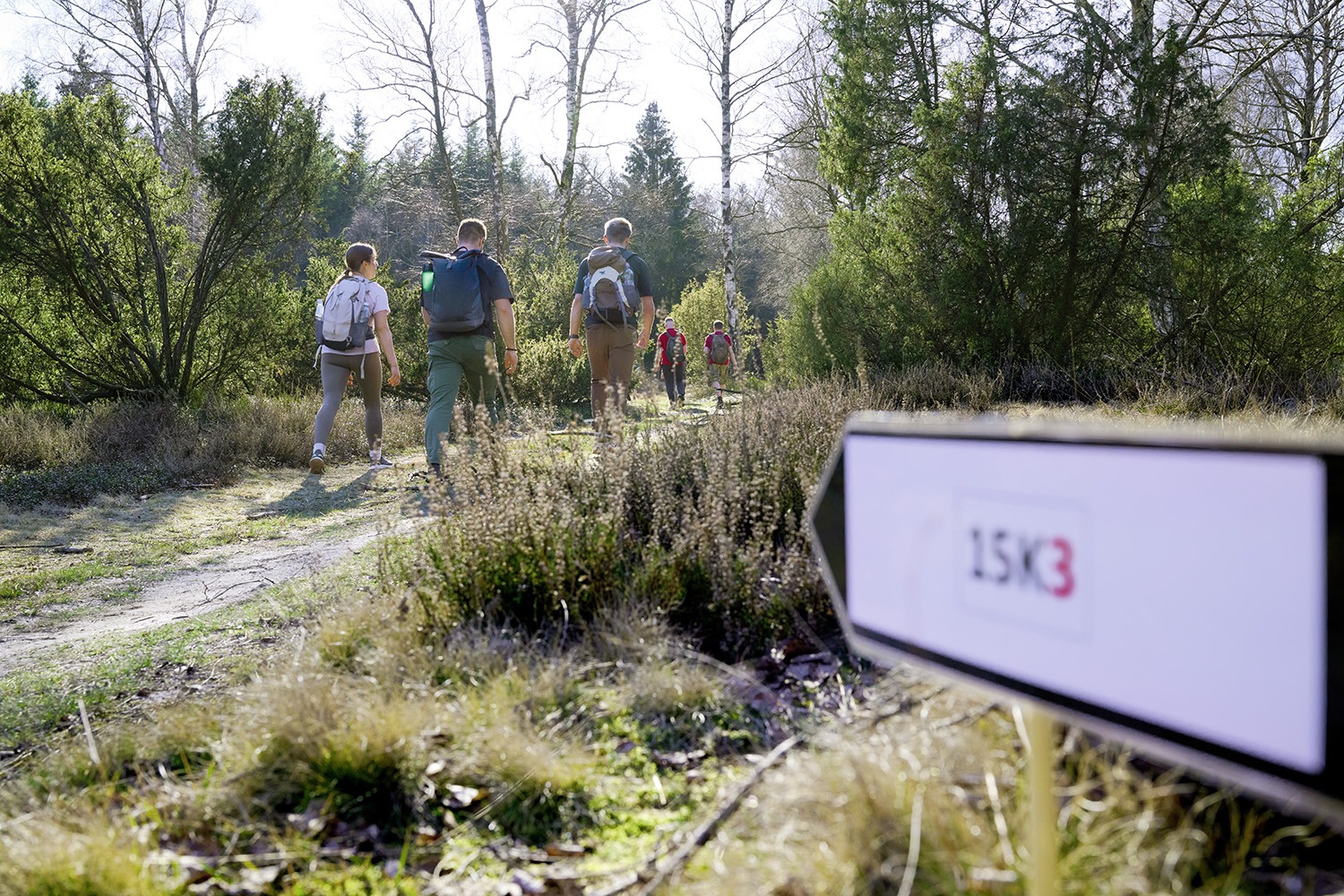
A root of the veteran’s movement
Nevertheless, the Good Friday battle is one of the roots of the modern German veterans’ movement. This primarily arose as a reaction to the official treatment – or rather non-treatment – regarding the commemoration of soldiers who had been killed in action or left physically and mentally scarred.
“While politics found it very difficult to cope with an official commemoration, and both the Bundeswehr and its foreign missions received little interest from society, more and more veterans’ initiatives emerged”, recalls Bohnert. “Those returning from deployment and their families founded associations and took further measures to draw attention to their unsatisfactory situation.” This occurred through marches, motorcycle convoys, commemorative events, publications and activities on social media, for example. One of these initiatives was the “K3” movement. On the tenth anniversary of the Good Friday battle, the influencer “NATO-Vet” called for a special commemorative march on social media: ten kilometres with ten kilograms of luggage – as a sign of remembrance for the three comrades (“K3”) who died in action.” 10K3 march” quickly developed into a movement: every year, the number of participants, the distance, and the weight increase – one kilometre more per year, one extra kilo in the backpack. Several tens of thousands of people took part in this year’s 15K3 march, including many Rheinmetall employees. At the company’s site in Unterlüß alone, a group of 120 persons set off on the march.
The breakthrough for the veterans’ movement came in 2022 with the ”turning point”. With hybrid threats and the need to strengthen Germany’s own defences, the Bundeswehr and its active and retired soldiers once again became more prominent in the public consciousness.
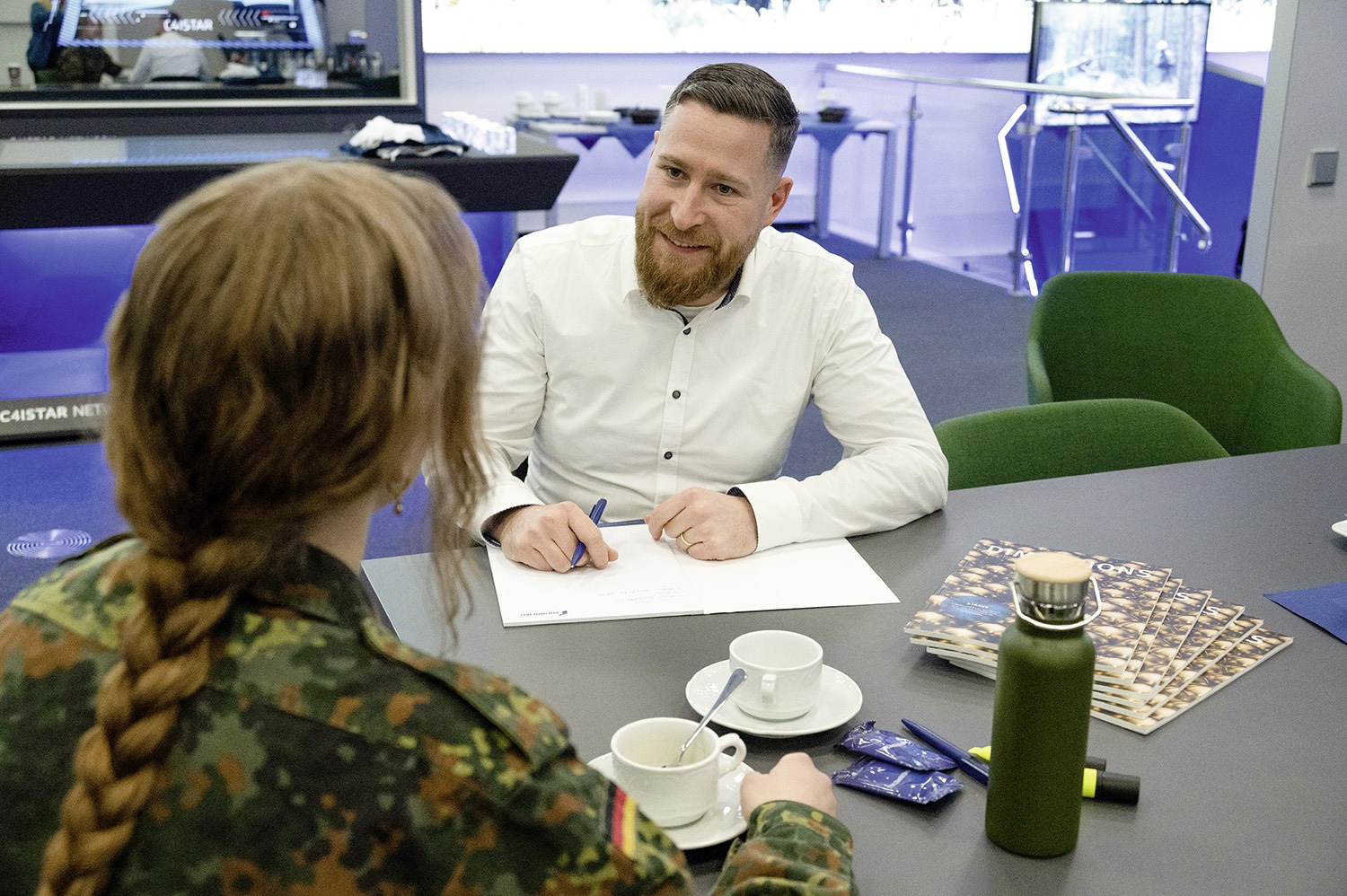
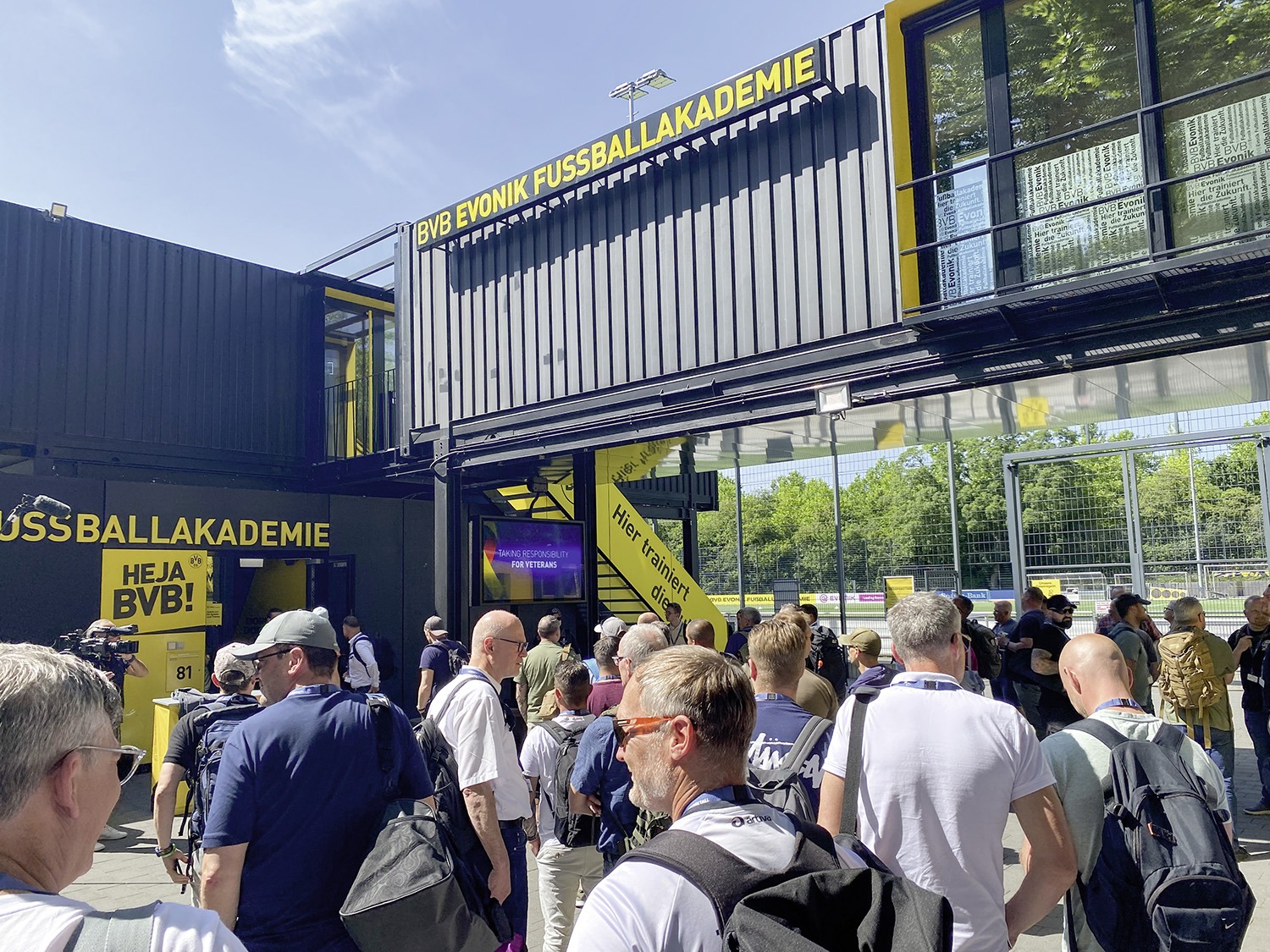
Taking responsibility for veterans
Their extensive experience is particularly in demand in the security and defence industries. Rheinmetall has always employed veterans: from former conscripts of the Cold War to retired soldiers as well as regular soldiers and Afghanistan veterans. It is therefore no surprise that the growing veteran’s movement in Germany has long been reflected in the company’s human resources department. Pascal Voß, back then in another role, began addressing this issue specifically with former soldiers in 2019. Today, as Team Lead Talent Acquisition Military Recruiting, he heads a five-person team that focuses on the needs of veterans at Rheinmetall.
“We offer former soldiers now in civilian careers the opportunity to continue working for the safety of their active comrades in civilian careers”, reports Voß. “We coordinate career orientation and work experience trainings for soldiers, conduct application training, organise soldier days at or in collaboration with Rheinmetall sites, and attend soldier-specific career fairs.” With success, as his colleague Denise Jäckel adds: “Through recruiting in Germany alone, we were able to hire over 550 new employees with a military background in 2024”. But their commitment also goes in the other direction: “Last year and for the first time, we gave those Rheinmetall employees who have not served in the military the opportunity to get in close contact with the army”, says Voß. ”This allows these colleagues to familiarize themselves with the Bundeswehr as a customer, and to see which requirements are placed on our products and systems in daily military life”.
What applies to Germany is also standard practice at Rheinmetall’s international sites. In its domestic markets in Australia and the United Kingdom, for example, there are cooperation programmes with the local armed forces to provide targeted support for veterans. In the United States, many long-serving and combat-experienced members of the Army, Navy, Air Force and Marines contribute their military expertise to the projects. Spain has launched initial measures, and Hungary plans to focus more intensely on
soldiers and veterans.
We say thank you!
Over the past decades, veterans of the German Armed Forces have contributed so much to society. Rheinmetall sent an important signal of appreciation with its event at Signal Iduna Park in Dortmund.
Mutually powerful
Last but not least, Rheinmetall demonstrated its solidarity with active and retired soldiers through various activities around the first German National Veterans’ Day. The commemorative day, which was established by the German Bundestag in 2024 and from 2025 on, will be celebrated annually, is associated with great hopes. Lieutenant Colonel Bohnert: “If we succeed in gradually filling this day with life, it can become the starting point for a real paradigm shift in society’s treatment of active and retired members of the Bundeswehr”. Rheinmetall made a visible contribution to this: ten sites displayed prominent banners – in Iffeldorf, Penzberg, Bremen, Kassel, Stockach, Unterlüß, Trittau, Weeze, Kiel, and Fronau. The official flag of the organiser was hoisted at the Group headquarters in Düsseldorf. At the same time, a video clip on a large LED screen drew the public’s attention to Veterans’ Day.
Additionally, Rheinmetall invited participants to its own veterans’ event. Around 75 participants from various company locations and guests from the Bund Deutscher EinsatzVeteranen e. V. (Association of German Veterans) celebrated the commemorative day shortly afterwards at Rheinmetall’s sponsorship partner BVB Borussia Dortmund in Signal Iduna Park. In addition to camaraderie and conversation, the programme included a stadium tour and sporting activities at the football academy. Initiatives like these clearly demonstrate that the veteran culture in Germany is gaining momentum – and Rheinmetall is part of this important development.
Click here to receive push notifications. By giving your consent, you will receive constantly information about new articles on the Dimensions website. This notification service can be canceled at any time in the browser settings or settings of your mobile device. Your consent also expressly extends to the transfer of data to third countries. Further information can be found in our data protection information under section 5.